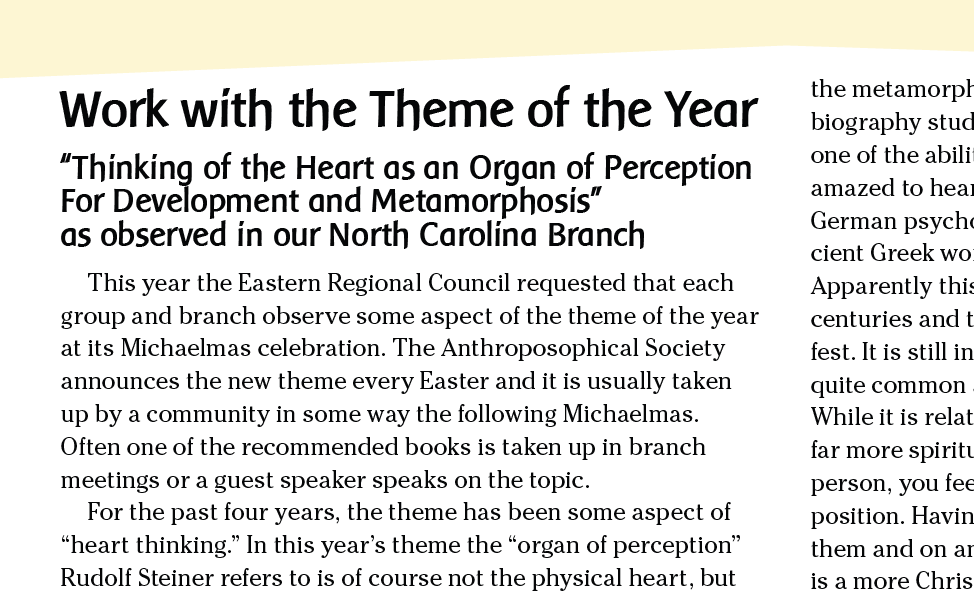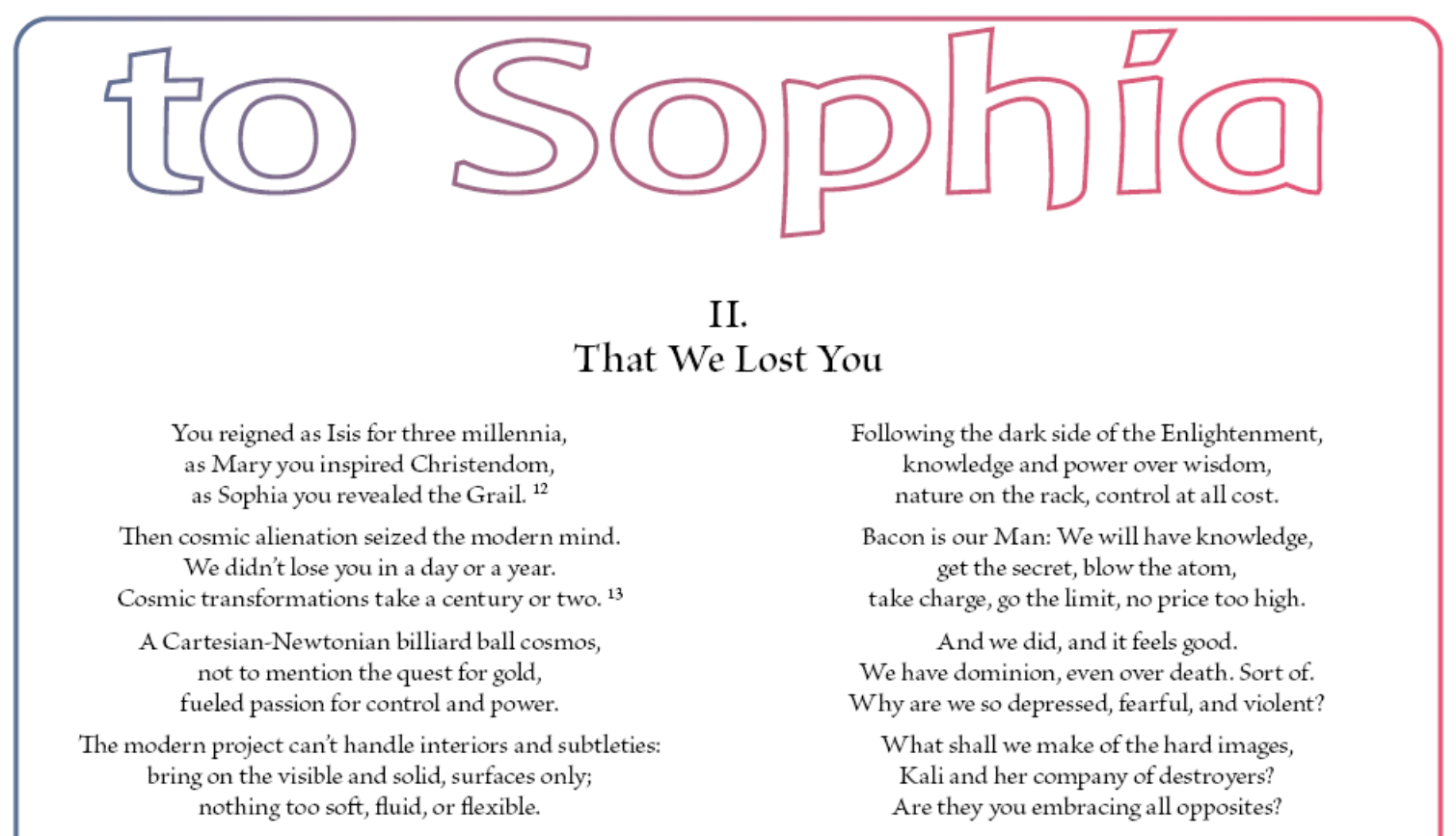
6 minute read
Thinking of the Heart as an Organ of Perception
Work with the Theme of the Year: “Thinking of the Heart as an Organ of Perception For Development and Metamorphosis” as observed in our North Carolina Branch
by Kathleen Wright
This year the Eastern Regional Council requested that each group and branch observe some aspect of the theme of the year at its Michaelmas celebration. The Anthroposophical Society announces the new theme every Easter and it is usually taken up by a community in some way the following Michaelmas. Often one of the recommended books is taken up in branch meetings or a guest speaker speaks on the topic.
For the past four years, the theme has been some aspect of “heart thinking.” In this year’s theme the “organ of perception” Rudolf Steiner refers to is of course not the physical heart, but what Eastern religions call the heart chakra or the twelve-petalled lotus, a spiritual area that surrounds the heart. By “metamorphosis” he is referring to the fact that through meditative practice and character development, this organ of perception evolves and develops new abilities.
This theme of “metamorphosis”—whose synonym is “evolution”—was chosen because this year marks the 200th birthday of Charles Darwin (February 12, 1809) and the 150th anniversary of the publication of his book Origin of the Species. The whole scientific community has commemorated this all over the world and it was felt important to shed some anthroposophical insight onto the theory. While Steiner felt that Darwin’s ideas were one-sided and materialistic, and that the philosophies that arose out of it (such as “natural selection” and “survival of the fittest”) were Ahrimanic, he also said that there is a “deeper understanding of Christianity that lies in Darwinism.” In other words, while Darwin had some misguided conclusions about evolution, the actual idea of evolution is extremely important, for all of creation is evolving, even the angels are evolving into archangels, the archangels into archai, and so on. Mankind is destined to become the tenth hierarchy, the Spirits of Love and Freedom. While Darwin’s theory holds that man is just a higher animal or “naked ape” (as in Desmond Morris’ book of that title), an anthroposophist might call the human being instead an evolving angel or a “dressed angel” (as an anthroposophical book by Paul Chu is entitled). The theme of evolution is involved in almost every topic Steiner addressed—spiritual development, the evolution of consciousness, and the metamorphosis of plants, to name a few.
Several suggestions were made for studying this year’s theme, one of which was to read Steiner’s mystery dramas from the perspective of how the characters evolve through their various incarnations. It is the last example which we observed in our community this Michaelmas with Marlene Joyce’s presentation of Goethe’s Fairy Tale of The Green Snake and the Beautiful Lily. As you probably know, Steiner was inspired to write his mystery dramas after reading Goethe’s tale and his characters are based on the tale’s archetypal characters. One could place this as the beginning of the study of those characters’ evolutions. This past summer, Margaretta and Bruce Bornhorst hosted a study group on the Portal of Initiation and we hope the work will continue in the coming year.
I would also like to mention one very interesting aspect of the metamorphosis of the heart chakra, discovered in our local biography study group last year. We learned that empathy is one of the abilities that the awakened heart develops, and were amazed to hear that this word first coined only in 1912 (by the German psychologist Theodor Lipps; I had thought it was an ancient Greek word). The term was not used in America until 1928. Apparently this phenomenon, empathy, was undeveloped for centuries and then not recognized when it first began to manifest. It is still in its early phase, even though the word is now quite common and we speak of individuals being “empaths.” While it is related to sympathy and compassion, empathy is far more spiritually evolved. When you have sympathy for a person, you feel sorry for them, and that puts you in a superior position. Having empathy for someone makes you at one with them and on an equal level; you feel what they are feeling. It is a more Christ-like virtue than sympathy. Rudolf Steiner tells us that empathy will eventually lead us to an understanding of another person’s destiny. We will then know not only know what the other is feeling, but why and for what purpose. When we have developed our hearts to that point of empathy where we recognize the other’s destiny, Steiner says that our encounters with other human beings will become actual sacraments. This will develop during the sixth cultural epoch, starting in the next millennium, but we should begin striving for it now.
A Christian Community minister named Baruch Urieli has written a couple of really beautiful books about the development of empathy. Our biography study group read excerpts from these. Urieli’s books include: Learning to Experience the Etheric World, from which we read the chapters “Empathy, the After-image and a New Social Ethic” and “Karmic Experience, Karmic Research and the Power of Empathy.” He has also written Male and Female: Developing Empathy. Both books are from Temple Lodge Press.
Another “evolving” word that has been circulating around our community lately, which ties in very strongly with the concepts of empathy and destiny is “entelechy.” It stems from the Greek words enteles (complete), telos (end, purpose, completion) and echein (to have). Entelechy was first coined by Aristotle and said to mean “the condition of something whose essence is fully realized or actualized.” Thomas Aquinas also used the word and gave it a more Christianized meaning. The great enlightened Jesuit Pierre Teilhard de Chardin (much of whose work was forbidden to be published in his lifetime by church officials) revived the word and was said to ask one of his students “What is the entelechy of you?” He explained that “it is inside you like the butterfly is inside the caterpillar… It means the dynamic purpose that is inside of you.”
Our community member Renate Wend has been asking people a similar question: “Who are you in your entelechy?” She has told us that Steiner evolved this word further to mean the entire human being with the sum total of all their past lives. One can surmise that this is a further evolution of the heart words mentioned above: sympathy –> compassion –> empathy –> knowledge of the other’s destiny –> knowledge of the other’s entelechy. Much food for thought and further research!
Kathleen Wright was editor of the Sophia Sun newsletter of the North Carolina branch and a member of the Eastern Regional Council.










